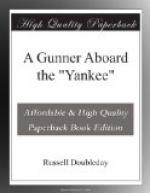CHAPTER VII.
We enter the “Theatre of war.”
The shrill pipe of the bosun’s whistle, followed by the order “All hands to muster,” reached our ears a day or two out from New York. We were enjoying an hour of well-earned leisure, so it was with reluctance that we obeyed and went aft on the gun deck. All hands are seldom called to muster, so we knew that something of importance was in the wind.
After the three-sided hollow square had been formed, the captain appeared. The small men stood on tip-toe, and the tall men craned their necks.
“We are about to enter the theatre of war,” said the captain, in his sharp, decisive way, “and I expect every man to do his duty, to redouble his efforts to preserve discipline, to perfect drills. Drills will, of a necessity, be frequent and hard. I would have you understand that our best protection is the fire from our own guns. The more rapid and accurate our fire, the safer we shall be. Pipe down.”
After we had been dismissed, the men formed little groups and discussed the captain’s speech.
“I like the ‘old man’s’ talk,” said the “Kid,” condescendingly; “it’s to the point and short. But how in the name of common sense are we going to find time to drill with more frequency? Three times a day and once or more at night, allows us just about time enough to eat and do the necessary routine work, to say nothing about sleeping. Clear ship, general quarters, and fire drill during the day, and general quarters after ten last night. That’s already somewhat frequent, methinks,” he concluded, suppressing a yawn.
“Well, if we are to have any scraps,” said “Bill,” “we certainly must know how to work the ship and the guns. For, as the skipper said, ’our own fire is our best protection.’”
We bowled along at a good fifteen-knot gait, day after day and night after night. The weather was magnificent and the climate delightful. It was full moon, and such a moon as few of us had seen before—so bright that letters could be and were written by her silvery light.
Though drills of all sorts were of constant occurrence, there were times after mess when we could “caulk off” and enjoy the glorious weather. Our experience of bad weather along the coast of New Jersey and Long Island had given us keen zest for the good conditions we were now enjoying. We were sailing along in the warm waters of the Gulf Stream—the Gulf weed peculiar to that current slipping by as we forged through it. “Stump,” “Dye,” of Number Eight’s gun crew, a witty chap and a good singer, “Hay,” and I were leaning over the taffrail, looking into the swirling water made by the propeller’s thrust, when “Dye” remarked: “This is the queerest water I ever saw in all my days; it looks like the bluing water our laundress used to make, with the suds mixed in.”




